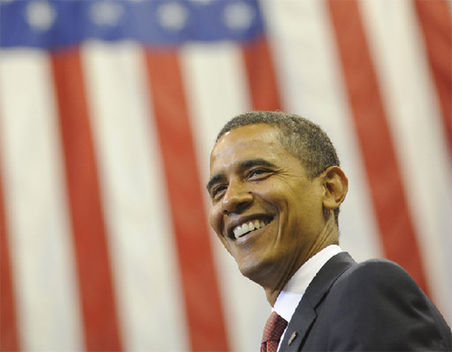Young voters will determine U.S. election
- By Wei Hongxia
 0 Comment(s)
0 Comment(s) Print
Print E-mail China.org.cn, September 29, 2012
E-mail China.org.cn, September 29, 2012
 |
|
Young voters steered Obama to win the U.S. presidential election four years ago. [File photo] |
When Barack Obama won the U.S. presidential election four years ago against John McCain, he carried 66 percent of voters under 30 years old, while McCain garnered 32 percent. As Obama and McCain were almost dead-even among older adults, it was these younger voters that steered Obama to victory in 2008.
But can Obama persuade young voters to support him again in 2012?
To do this, Obama must understand the changes in American social structure. First is the changes to the employment situation brought on by information technology. In a traditional industrial society, people choose careers according to majors they learned in university. Workers would typically join the labor union of their particular industry or field, which allowed them to gain regular salary increases and better welfare, according to the union’s relationship with the government and employers.
Today, big industry is no longer a dominant force in America – indeed, some smaller enterprises have been able to consistently produce more jobs due to their capabilities for innovation. As large companies reduce their workforces, the influence of the labor union has declined accordingly. In contrast, government is more powerful, and public policy made by the government is becoming more important as well.
For example, taxes paid by American working people are used to pay for social security and Medicare programs, which are regulated and controlled by the government. Obama’s new health insurance reform asks young people to buy more medical insurance than they actually need. If young people feel that this mandatory insurance requirement will hurt their wallets more than it benefits their health, they may choose to vote for Republican challenger Mitt Romney in the upcoming election.
In addition, Obama has promised young Americans greater access to low-interest student loans. But some believe that more federally-funded student loans may cause a bubble in the higher education system, leading to higher tuition and increased competition for admission. Obama’s policies should not claim to benefit young Americans but then force them to shoulder an increased burden in the future.
Although Obama currently leads Romney in the polls, his failure to inspire young voters like he did in the 2008 campaign could be a tough nut to crack. Who can inspire more young voters, whether based on economic, social welfare, moral issues, or foreign policy, will likely win the White House on coming Nov. 6.
The author is now a visiting scholar with the Carnegie Endowment for International Peace. She is a columnist with China.org.cn. For more information please visit: http://m.91dzs.com/opinion/weihongxia.htm
(This post was written in Chinese and translated by Gong Yingchun)
Opinion articles reflect the views of their authors, not necessarily those of China.org.cn.






